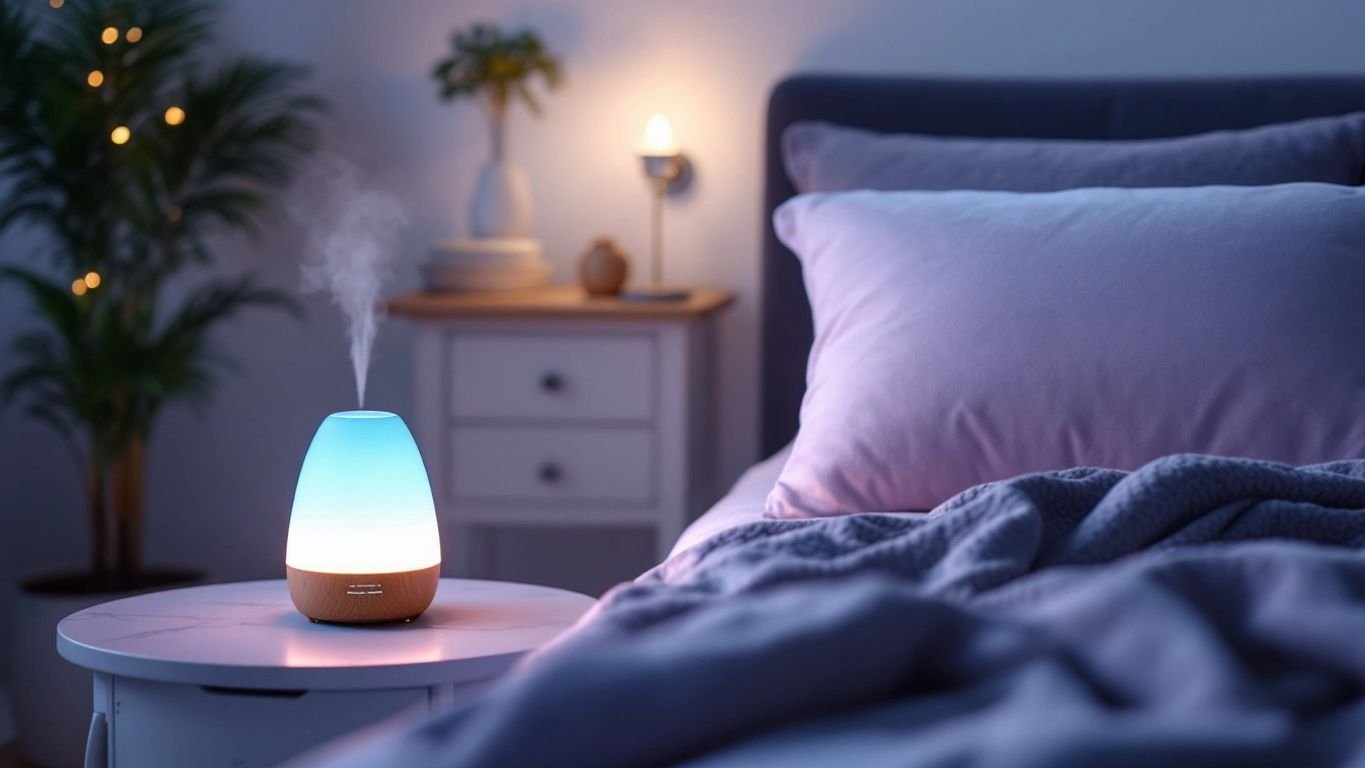
Sleep disorders, particularly sleep apnea, affect millions of people and can lead to serious health issues. Fortunately, there are many innovative treatments available that help improve sleep quality and overall health. This article explores various modern solutions, including new technologies, patient-focused care, and lifestyle changes that can make a significant difference in managing sleep apnea.
Key Takeaways
- Sleep apnea comes in different types, primarily obstructive and central, each requiring specific treatment approaches.
- New technologies like smart CPAP machines and wearable devices are changing how sleep apnea is treated, making it easier for patients to manage their condition.
- Oral appliances are effective alternatives to CPAP therapy, providing a less invasive option for many patients.
- Personalized treatment plans and collaboration with healthcare providers are crucial for successful sleep apnea management.
- Lifestyle changes, such as weight loss and sleep position adjustments, can significantly improve sleep apnea symptoms.
Understanding Sleep Apnea

Sleep apnea is a condition that can really mess with your nights and leave you feeling drained during the day. It’s not just about snoring; it’s a serious issue! There are two main types: obstructive sleep apnea (OSA) and central sleep apnea (CSA). OSA is the more common one, where your throat muscles relax too much and block your airway. On the other hand, CSA happens when your brain doesn’t send the right signals to control your breathing.
Types of Sleep Apnea
- Obstructive Sleep Apnea (OSA): This is when your airway gets blocked during sleep.
- Central Sleep Apnea (CSA): This type is about your brain not signaling your body to breathe.
- Complex Sleep Apnea Syndrome: A mix of both OSA and CSA.
Symptoms and Diagnosis
If you think you might have sleep apnea, look out for these signs:
- Loud snoring
- Gasping or choking during sleep
- Feeling tired even after a full night’s sleep
Getting diagnosed usually involves a sleep study, where doctors monitor your breathing and other functions while you sleep.
Health Risks Associated with Sleep Apnea
Ignoring sleep apnea can lead to some serious health problems, like:
- Heart disease
- High blood pressure
- Diabetes
- Mental health issues like depression
Understanding sleep apnea is crucial because it can affect your overall health. The sooner you recognize the symptoms, the better your chances of getting effective treatment.
So, if you or someone you know is struggling with sleep, it’s time to take it seriously. Sleep apnea may be even more dangerous than we think!
Innovative Technologies in Sleep Apnea Treatment
When it comes to tackling sleep apnea, new technologies are changing the game. Let’s dive into some of the coolest innovations that are making a real difference:
Wearable Devices for Better Sleep
Wearable devices are becoming super popular for monitoring sleep. They can track your sleep patterns and even detect when you’re having trouble breathing. Here’s what they can do:
- Monitor your heart rate and oxygen levels.
- Provide feedback on your sleep quality.
- Remind you to stick to your treatment plan.
Smart CPAP Machines
These machines are like the upgraded version of traditional CPAP devices. They automatically adjust air pressure based on your needs, making it way more comfortable. Some benefits include:
- Quieter operation for a peaceful night.
- Real-time adjustments for better airflow.
- Built-in tracking to help you and your doctor see your progress.
Implantable Devices
For those who need a more permanent solution, implantable devices are a new option. These tiny gadgets are surgically placed in your body to keep your airway open while you sleep. They can:
- Reduce snoring significantly.
- Help you breathe easier at night.
- Offer a long-term solution for severe cases.
The future of sleep apnea treatment is looking bright with these innovations. They not only improve comfort but also help us get the rest we need.
In summary, these innovative technologies are making it easier for people with sleep apnea to find effective treatments. Whether it’s through wearables, smart machines, or implantable devices, there’s a lot to be excited about!
The Role of Oral Appliances in Sleep Apnea Treatment
How Oral Appliances Work
Oral appliances are pretty cool! They’re custom-made mouthpieces that help keep your airway open while you sleep. Basically, they gently push your jaw forward, which can stop those annoying blockages that cause sleep apnea. These devices are less invasive than CPAP machines, making them a popular choice for many folks.
Benefits of Oral Appliances
Using oral appliances comes with a bunch of benefits:
- Comfortable: They’re usually more comfortable than CPAP masks.
- Portable: Easy to carry around, perfect for travel.
- Effective: Many people find them to be effective in reducing snoring and improving sleep quality.
Choosing the Right Oral Appliance
When it comes to picking the right oral appliance, it’s important to consult with your dentist or doctor. They can help you find one that fits well and meets your specific needs. Here are some tips:
- Get a professional fitting: This ensures the appliance is comfortable and effective.
- Discuss your symptoms: Share your sleep issues to find the best option.
- Follow up regularly: Check in with your healthcare provider to make sure it’s working for you.
Oral appliances can be a game-changer for those struggling with sleep apnea. They offer a less invasive option that can lead to better sleep and overall health!
Patient-Centric Approaches to Sleep Disorder Treatment
When it comes to tackling sleep apnea, I’ve noticed that a patient-centric approach is really gaining traction. This means that the focus is on what we need and prefer in our treatment plans. Here’s what I’ve found to be super important:
Personalized Treatment Plans
Personalized treatment plans are key! They’re tailored to fit each person’s unique needs, which can make a huge difference in how effective the treatment is. Here are a few reasons why they matter:
- They help improve sleep quality.
- They ensure the treatment is effective for each individual.
- They can boost overall satisfaction with the care we receive.
Collaborating with Healthcare Providers
Working together with healthcare providers is essential. It’s all about having open conversations about our symptoms and preferences. Here’s how we can make the most of it:
- Discuss your symptoms honestly.
- Share your treatment preferences.
- Explore new technologies and options together.
The Role of Technology
Technology is a game-changer in customizing our treatment. For instance, some devices can adjust air pressure based on our breathing patterns while we sleep. This means we get the right amount of air we need, making the treatment more effective.
In the end, it’s all about finding what works best for us. The more involved we are in our treatment, the better our chances of getting a good night’s sleep!
Lifestyle Changes to Improve Sleep Apnea
When it comes to tackling sleep apnea, making some simple lifestyle changes can really help. Here are a few things I’ve found useful:
Weight Loss and Diet
- Losing even a little weight can make a big difference. If you’re carrying extra pounds, shedding just 10% can help reduce the severity of obstructive sleep apnea (OSA).
- Eating healthier foods can also improve your overall sleep quality. Think fruits, veggies, and whole grains!
Sleep Position Adjustments
- Sleeping on your side instead of your back can keep your airway open. It’s a small change that can lead to better sleep.
- You might want to try using a body pillow to help you stay on your side throughout the night.
Avoiding Alcohol and Smoking
- Cutting back on alcohol, especially before bed, can help reduce sleep apnea symptoms. Alcohol relaxes your throat muscles, which can worsen OSA.
- If you smoke, quitting can also improve your sleep. Smoking irritates your airways, making it harder to breathe at night.
Making these changes isn’t always easy, but they can lead to better sleep and overall health. It’s worth giving it a shot!
By focusing on these lifestyle adjustments, I’ve noticed a significant improvement in my sleep quality. Remember, every little bit helps!
Telemedicine and Remote Monitoring for Sleep Disorders

Benefits of Telemedicine
Let’s face it, life can get busy, and sometimes getting to a doctor’s office feels like a huge task. Telemedicine makes it super easy to get help for sleep disorders without leaving your home. Here are some cool benefits:
- Convenience: You can chat with a doctor from your couch.
- Time-Saving: No more waiting rooms or long drives.
- Access to Specialists: You can connect with experts who might not be nearby.
Home Sleep Testing
So, how does it work? Well, after a quick online visit, you might get a Home Sleep Testing device sent to you. This means you can sleep in your own bed while the device tracks your sleep patterns. It’s like having a sleep lab at home! Here’s what usually happens:
- Schedule a telemedicine appointment.
- Get the home testing device shipped to you.
- Wear it for a night and send it back.
Continuous Remote Monitoring
Once you’re diagnosed, the journey doesn’t stop there. Continuous remote monitoring helps keep track of your progress. This means:
- Regular check-ins with your doctor.
- Adjustments to your treatment plan if needed.
- Support from sleep specialists whenever you need it.
Telemedicine is changing the game for sleep disorder treatment, making it easier for everyone to get the help they need.
In short, telemedicine and remote monitoring are making it easier than ever to tackle sleep disorders. With these tools, we can take charge of our sleep health without the hassle of traditional visits. So, if you’re struggling with sleep issues, don’t hesitate to explore these options!
The Impact of Sleep Apnea on Mental Health

Link Between Sleep Apnea and Depression
You know, sleep apnea isn’t just about snoring or feeling tired. It can really mess with your mental health. I’ve seen it firsthand. When you’re not getting enough quality sleep, it can lead to feelings of sadness and anxiety. It’s like a vicious cycle—poor sleep leads to poor mood, which can make sleep even harder to come by.
Cognitive Effects of Sleep Apnea
Let’s talk about how sleep apnea can affect your brain. Here are a few things I’ve noticed:
- Memory issues: It’s tough to remember things when you’re constantly tired.
- Concentration problems: Focusing on tasks can feel like climbing a mountain.
- Decision-making difficulties: Sometimes, I find it hard to make even simple choices.
Managing Mental Health Alongside Sleep Apnea
So, what can we do about it? Here are some tips that have helped me:
- Talk to a professional: Don’t hesitate to reach out to a therapist or counselor.
- Stick to a sleep schedule: Going to bed and waking up at the same time can help.
- Practice relaxation techniques: Things like meditation or deep breathing can really make a difference.
Taking care of your mental health is just as important as treating sleep apnea. It’s all connected, and addressing one can help with the other.
In short, sleep apnea can have a huge impact on how we feel mentally. It’s essential to recognize these links and take steps to improve both our sleep and our mental well-being. Let’s not ignore the signs!
Traditional Treatments for Sleep Apnea
When it comes to tackling sleep apnea, there are a few traditional methods that can really help. These treatments often focus on lifestyle changes, medical devices, and sometimes even surgery. Let’s break it down:
CPAP Therapy
- Continuous Positive Airway Pressure (CPAP) machines are the most common treatment. They keep your airway open by providing a constant stream of air.
- Many people find the mask uncomfortable at first, but it can be a game-changer for getting better sleep.
- It’s crucial to use it regularly for the best results.
Oral Appliances
- These are custom-made devices that help keep your jaw in a position that keeps your airway open.
- They’re less intrusive than CPAP machines and can be a good option for those who can’t tolerate CPAP.
- In November 2023, Vivos Therapeutics got FDA clearance for a new oral device that can help manage sleep apnea effectively.
Surgical Options
- In some cases, surgery might be necessary to remove excess tissue from the throat or to correct structural issues.
- This is usually considered when other treatments haven’t worked.
- Surgery can be a big step, so it’s important to discuss all options with your doctor.
Remember, it’s essential to talk to a healthcare provider about the best treatment for your specific situation. Everyone’s different, and what works for one person might not work for another.
So, whether it’s adjusting your lifestyle, trying out a CPAP machine, or considering surgery, there are options out there to help you get the restful sleep you deserve!
The Future of Sleep Disorder Treatments
Emerging Research and Innovations
I’m really excited about the future of sleep disorder treatments! There’s a ton of research happening right now that’s paving the way for new solutions. Innovative technologies are being developed to make treatments more effective and comfortable. Here are a few cool things to look out for:
- Wearable devices that track sleep patterns and adjust treatments in real-time.
- Smart CPAP machines that automatically adjust air pressure based on your needs.
- Implantable devices that help keep your airway open while you sleep.
Potential Breakthroughs
We’re on the brink of some amazing breakthroughs in sleep disorder treatments. I mean, who wouldn’t want a solution that’s less invasive and more effective? Some potential breakthroughs include:
- Advanced oral appliances that are custom-made for each individual.
- Machine learning and AI that help doctors create personalized treatment plans.
- New software applications that monitor sleep and provide feedback to improve treatment.
What Patients Can Expect
As these innovations roll out, patients can expect a more tailored approach to their treatment. The goal is to make sleep apnea management easier and more effective. I believe that with these advancements, we’ll see a significant improvement in sleep quality for many people.
The future looks bright for those struggling with sleep disorders. With ongoing research and new technologies, better sleep is just around the corner!
The Importance of Early Diagnosis and Treatment
Recognizing Early Symptoms
When it comes to sleep apnea, catching it early can make a huge difference. Many people don’t realize they have it until it’s too late. Here are some signs to look out for:
- Loud snoring
- Waking up gasping for air
- Feeling tired even after a full night’s sleep
If you notice these symptoms, it’s time to talk to a doctor.
Diagnostic Tools and Tests
Getting diagnosed is easier than you might think. Doctors use a few different tools to figure out if you have sleep apnea:
- Sleep studies (either in a lab or at home)
- Questionnaires about your sleep habits
- Physical exams to check for risk factors
These tests help pinpoint the problem so you can get the right treatment.
Benefits of Early Intervention
Taking action early can really help your health. Here’s why:
- Reduces the risk of serious health issues like heart disease
- Improves your overall sleep quality
- Boosts your mood and energy levels
Early diagnosis isn’t just about sleep; it’s about your overall health. The sooner you act, the better you’ll feel!
So, if you think you might have sleep apnea, don’t wait. Talk to your healthcare provider and get the help you need. Remember, early action can lead to better rest and a healthier life!
The Role of Healthcare Providers in Sleep Disorder Management

When it comes to managing sleep disorders, healthcare providers are like the guiding stars in a dark sky. They help us navigate through the complexities of conditions like sleep apnea. Having the right support can make all the difference!
Primary Care Physicians
- They are often the first point of contact for patients.
- They can recognize early symptoms and refer patients to specialists.
- They play a crucial role in monitoring overall health and managing comorbid conditions.
Specialists Involved in Treatment
- Pulmonologists focus on breathing-related issues.
- Otolaryngologists (ENTs) deal with throat and nasal problems.
- Sleep specialists provide targeted care for sleep disorders.
Coordinating Care for Better Outcomes
- Communication between different healthcare providers is key.
- Patients should feel empowered to ask questions and share their concerns.
- Regular follow-ups help in adjusting treatment plans as needed.
Working together with healthcare providers can lead to better management of sleep disorders, ensuring that patients receive comprehensive care tailored to their needs.
In summary, the role of healthcare providers is vital in managing sleep disorders. They not only diagnose and treat but also support us in our journey to better sleep. Remember, you’re not alone in this!
Healthcare providers play a crucial role in helping people manage sleep disorders. They can offer guidance, support, and treatment options tailored to individual needs. If you or someone you know struggles with sleep issues, don’t hesitate to reach out for help. Visit our website to learn more about effective solutions and take the first step towards better sleep today!
Wrapping It Up: Sleep Better, Live Better
So, there you have it! With all these cool new treatments for sleep disorders, getting a good night’s sleep is more possible than ever. Whether it’s fancy gadgets or personalized plans, there’s something out there for everyone. Don’t let sleep issues hold you back from living your best life. Talk to your doctor, explore your options, and take that first step towards better sleep. Remember, better sleep means better days ahead!
Frequently Asked Questions
What is sleep apnea?
Sleep apnea is a condition where a person has trouble breathing while sleeping. This can cause them to wake up often and not get enough rest.
What are the signs of sleep apnea?
Common signs include loud snoring, feeling very tired during the day, and waking up with a dry throat or headache.
How is sleep apnea diagnosed?
Doctors usually diagnose sleep apnea through a sleep study, which can be done at home or in a sleep clinic.
What treatments are available for sleep apnea?
Treatments can include lifestyle changes, special machines that help you breathe at night, or oral devices that keep your airway open.
Are there any new technologies for treating sleep apnea?
Yes, there are new tools like smart CPAP machines and wearable devices that help monitor sleep and improve treatment.
Can lifestyle changes help with sleep apnea?
Absolutely! Losing weight, changing your sleep position, and avoiding alcohol can all help reduce sleep apnea symptoms.
How does telemedicine work for sleep apnea treatment?
Telemedicine allows you to talk to a doctor online. They can guide you through your diagnosis and treatment without needing to visit a clinic.
What should I do if I think I have sleep apnea?
If you think you have sleep apnea, it’s important to talk to a doctor. They can help you find the right tests and treatments.
About the Author






0 Comments